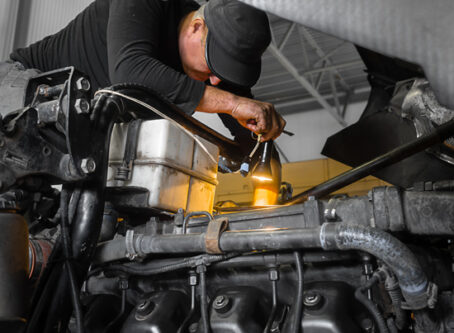OOIDA asks U.S. Supreme Court to hear Indiana Toll Road lawsuit
After a nearly three-year battle, the Owner-Operator Independent Drivers Association is asking the U.S. Supreme Court to hear its case regarding the constitutionality of the Indiana Toll Road.
On Tuesday, Sept. 7, OOIDA filed a petition to the United States Supreme Court to decide if the Indiana Toll Road is constitutional. The Association’s lawsuit claims a truck-only toll increase of 35% is discriminatory, excessive and violates the Commerce Clause in the Constitution. At the heart of the case is whether or not the state of Indiana qualifies for the “market participant” exemption of the Commerce Clause.
Monte Wiederhold, one of the named plaintiffs in the class action lawsuit, got involved “to take a stand against these types of government overreach.”
“Small business, independent truckers are the least able to pass along these exorbitant increases” Wiederhold said. “Increasing fuel taxes, such as the cost of fuel, can be offset with fuel surcharges. Tolls can’t. Mega carriers like UPS, YRC will build these increases into their rate structures and the consumers will be left with a choice of pay it or do without.”
Market participant exemption
In March, a panel for the Seventh Circuit federal appeals court affirmed an Indiana federal district court’s ruling dismissing OOIDA’s Indiana Toll Road lawsuit. The panel found that the tolls are not subject to Commerce Clause restrictions based on the market participant exemption.
Since Congress has jurisdiction over interstate commerce, the Dormant Commerce Clause prohibits states from passing legislation that discriminates against other states in interstate commerce. Specifically, a state cannot burden or discriminate against out-of-state economic interests.
OOIDA contends that the Indiana Toll Road does exactly that. According to OOIDA’s complaint, Holcomb’s announcement of the Next Level Connections program would use $1 billion paid as consideration for the Indiana Toll Road Concession Co.’s right to extract increased tolls from motor carriers and truck drivers to fund a variety of projects throughout the state. Those state projects included $100 million “to bring high-speed, affordable broadband access to underserved areas”; $90 million for hiking, biking and riding trails; $600 million toward the completion of I-69, $190 million for various highway projects; and $120 million to add more nonstop flights at the Indianapolis airport.
“The Next Level Connections program provides no benefit to the users of the toll road in their capacity as users of the toll road,” the lawsuit states. “Prior to raising the tolls applicable to heavy vehicles on Oct. 5, 2018, toll receipts from commercial motor vehicles had been at least sufficient to cover Class 3 and higher commercial motor vehicles’ fair share of the cost of operating and maintaining the toll road.”
OOIDA said that the Next Level Connections program shifts the burden for much of Indiana’s infrastructure costs from the citizens of Indiana to truck drivers who use the Indiana toll road.
The Association also contends that Indiana can’t evade its constitutional obligations to users of the toll road by entering into a public-private partnership permitting an entity other than the state to fix and collect the tolls.
On the other hand, the Indiana Toll Road Concession Co. and the state of Indiana argue the tolls fall under the market participant exemption of the Commerce Clause. Although the Dormant Commerce Clause does not allow states to discriminate against interstate commerce through legislation, there is an exemption when the state is the buyer or seller of a product or service. If a state can show that it is acting in a way that any private individual or entity could, it is exempt from the Commerce Clause as a market participant.
In this case, Indiana claims that it is selling access to the toll road in a way that any private individual or entity would. The Seventh Circuit agreed.
“We may suppose, as plaintiffs allege, that the $1 billion received for the 2018 toll increase was used for state purposes unrelated to maintenance of the toll road,” the appellate opinion states. “Why should that matter? A state, like any private proprietor, can turn a profit from its activities.”
Indiana Toll Road violates Constitution
However, OOIDA argues in its Supreme Court petition that the Seventh Circuit completely ignored the idea that the Indiana Toll Road, like any other interstate roadway, is an essential government function. Therefore, no private proprietor could act in the same manner since the private sector does not have access to that product. In fact, Indiana state statute calls the work of the Indiana Finance Authority “an essential governmental, public, and corporate function.”
Additionally, the state’s ownership of the Indiana Toll Road is possible by its police power for enforcement, use of eminent domain and tax exemptions. All of those elements are not available to proprietary businesses in the marketplace.
For those reasons, OOIDA claims the market participant exemption cannot apply. The Association argues that the Seventh Circuit only considered the buyer/seller aspect of the Indiana Toll Road while ignoring the exclusive government function aspect. According to the Supreme Court petition, the Second, Third and Ninth Circuit federal appellate courts have ruled contrary to the Seventh Circuit. Therefore, the Supreme Court needs to decide on this case for the sake of uniformity regarding federal law precedent.
Assuming the Indiana Toll Road is not exempt, OOIDA claims Gov. Eric Holcomb explained the discriminatory nature of the tolls.
“The majority of the traffic is from out-of-state,” Holcomb said. “We’re capturing other people’s money.”
OOIDA expects a response from the Supreme Court sometime this fall.
“Hopefully (the Supreme Court) will take the case, as these situations affect all Americans eventually due to higher prices for goods and services,” Wiederhold said. “This is a case that affects some of the hardest working among us – small business truckers.” LL









